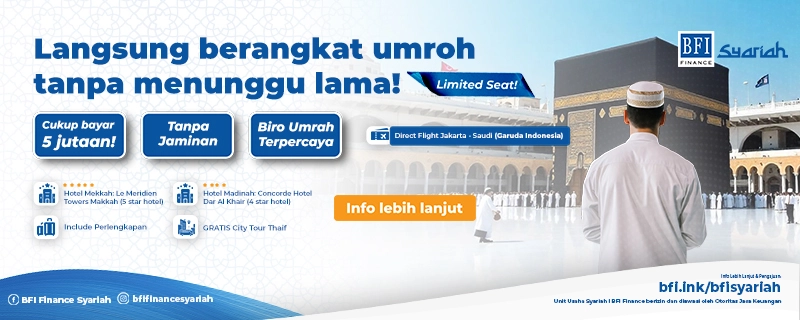A musafir refers to someone who undertakes a long journey to a specific destination within a certain period of time—such as traveling across regions to visit family before Eid al-Fitr.
In Islam, this term is often discussed in fiqh (Islamic jurisprudence) because it holds a special status, accompanied by particular rulings and exemptions in carrying out religious obligations.
A musafir is granted certain concessions, but there are conditions that must be met for the status to be valid according to Islamic law.
To better understand who qualifies as a musafir and what privileges are granted to them, let’s take a closer look below.
What Is a Musafir?
The term musafir comes from the Arabic word meaning “a person who travels.” According to the Shafi‘i and Hanbali schools of thought, a musafir is someone who embarks on a journey for a specific purpose, covering a particular distance, based on ‘urf (local custom or social norms).
In other words, if a journey is generally considered safar by the community, the status of musafir applies even if the distance is not very far. Conversely, if a journey is not regarded as safar, no worship concessions apply.
Conditions for Being a Musafir
During the time of the Prophet Muhammad ﷺ, a journey (safar) was usually measured by its duration. The Shafi‘i school defines a musafir as someone traveling for at least two days, while the Hanafi school sets it at three days.
In general, a person is considered a musafir if they meet the following conditions:
-
The journey covers a distance of approximately 85 km (about 52 miles) or more, or according to local custom (‘urf).
-
The traveler does not intend to stay at the destination for more than four days.
-
The journey is undertaken for a lawful (mubah) purpose, not for sinful acts.
A musafir is also granted rukhsah (concessions) such as being allowed to break their Ramadan fast, under these conditions:
-
The journey meets the distance requirement that permits shortening (qasar) of prayers—around 81–85 km.
-
The traveler departs before dawn and has left the boundaries of their residence.
-
If departure occurs after dawn, breaking the fast is not permitted.
-
While still on the journey, the musafir may skip fasting, but must resume fasting once settled at their destination.
It should be noted that a musafir may still choose to fast if they are able to. If they decide to break their fast, they must make it up on other days after Ramadan.
Privileges Granted to a Musafir
A musafir receives several forms of rukhsah to make worship easier during travel. These include:
1. Permission to Shorten Prayers (Salat Qasar)
A musafir is allowed to shorten four-rak‘ah prayers to two rak‘ahs.
This is one of the special rulings that ease prayer obligations during travel.
As stated in the Qur’an, Surah An-Nisa [4]:101, Allah permits the shortening of prayers while on a journey.
Scholars agree that the prayers which may be shortened are Dhuhr, ‘Asr, and ‘Isha, while Maghrib and Fajr remain unchanged due to their specific rak‘ah counts.
2. Permission to Combine Prayers (Jamak)
According to Imam al-Shafi‘i, a musafir is allowed to combine two prayers within one time period.
-
Dhuhr and ‘Asr may be combined at either time.
-
Maghrib and ‘Isha may be combined at either time as well.
These can be performed at full length or shortened (qasar) if they are four-rak‘ah prayers.
3. Praying While Traveling
A musafir is still obligated to perform the obligatory prayers, even while on the move.
The Prophet Muhammad ﷺ was known to perform voluntary (sunnah) prayers on his mount, facing any direction. However, for obligatory prayers, he would dismount and face the Qiblah (Narrated by Bukhari).
In special situations—such as fearing that prayer time may end—a musafir may pray while on a vehicle, as the Prophet ﷺ instructed Ja‘far ibn Abi Talib to do so aboard a ship (Narrated by Al-Bazzar).
Guidelines for praying while traveling include:
-
Standing and facing the Qiblah if possible.
-
Performing prayers in congregation, especially for men.
-
Maintaining the usual order of movements.
-
If unable to bow or prostrate, one may gesture with the head according to ability.
-
If water is unavailable, tayammum (dry ablution) is permitted.
4. Permission Not to Fast
A musafir may skip fasting during Ramadan but must make up for the missed days afterward.
This is based on Allah’s words in Surah Al-Baqarah [2]:185, which states that those who are ill or traveling may break their fast and complete it on other days.
This exemption reflects Allah’s mercy and His desire for ease, not hardship, in worship.
5. Eligibility to Receive Zakat
Among the groups entitled to receive zakat is ibnu sabil—a traveler who has run out of provisions during their journey and cannot return home.
This form of assistance helps them continue their travel or return safely to their place of origin.
The Wisdom Behind Concessions for Musafir
Every concession granted to travelers carries profound wisdom. Here are some key lessons:
1. A Sign of Allah’s Mercy
Rukhsah for travelers reflects Allah’s compassion for His servants, demonstrating that Islam is a religion of ease and mercy.
As Allah affirms in Surah Al-Baqarah [2]:185, “Allah intends for you ease and does not intend for you hardship.”
2. A Reflection of Justice and Humanity
These concessions highlight Islam’s fairness and humanity. People face different circumstances, and Allah provides leniency suited to each situation.
Imam al-Shafi‘i explained that travel often involves difficulty, and Allah’s mercy grants ease so that worship remains manageable.
3. Ease Without Diminishing Obedience
These allowances do not lessen one’s devotion but rather ensure that worship can be performed with peace of mind.
As stated in Surah Al-Hajj [22]:78, “And He has not placed upon you in the religion any hardship.”
By understanding the concept of musafir, along with its conditions and privileges, you can perform acts of worship more comfortably while still adhering to Islamic principles—even when traveling long distances.
In addition to maintaining worship, it’s also important to strive for financial well-being through lawful and trustworthy means.
If you’re in need of additional funds, consider applying for Sharia Financing through BFI Finance’s Sharia Business Unit (UUS).
With BFI Finance Sharia Multipurpose Financing, you can obtain Sharia-compliant funding for various purposes—such as additional business capital, purchasing goods, or meeting family needs.
Backed by transparent processes and supervision from the Financial Services Authority (OJK), BFI Finance Sharia serves as a reliable and ethical financial partner to help you fulfill your goals.
With BFI Finance Sharia, you can feel #MoreAtEaseInEveryStep toward a life full of blessings.






